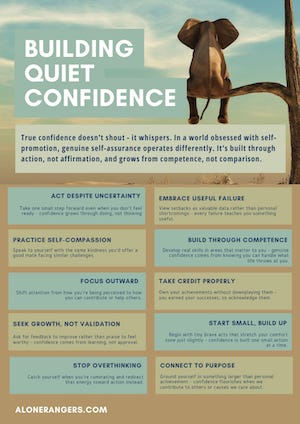Building Quiet Confidence (with Infographic)
Some of the most effective confidence-building strategies are surprisingly simple and can be woven into your daily life.
This is a follow-up from my article “The Quiet Power of True Confidence”, the seventh in a series of articles about ten qualities of a good human - dimensions of character to cultivate over a lifetime.
Here are ten strategies for developing authentic self-assurance without needing to shout about it.
"Confidence is silent. Insecurities are loud." This simple observation from Don Sibet fundamentally changed how I think about self-assurance.
For years, I bought into the "fake it till you make it" mentality. Confidence meant projecting strength, having all the answers, and never showing uncertainty. The result? I felt like I was constantly performing, exhausted from trying to maintain an image that wasn't really me.
The breakthrough came when I realised that the most confident people I knew weren't the loudest ones in the room. They were the ones who could admit when they didn't know something, who asked for help when they needed it, and who seemed comfortable with their imperfections. They had what we should call "quiet confidence."
Research from "The Confidence Code" by Katty Kay and Claire Shipman backs this up. They found that genuine confidence comes from action, not affirmation. It's built through competence, not comparison. And it grows stronger when we focus on others rather than ourselves.
The most surprising discovery? Trying to appear perfect actually undermines confidence. When we're constantly managing our image, we lose the ability to be present, to learn, and to connect authentically with others.
I had to unlearn the idea that confidence meant being in control all the time. Real confidence is being comfortable with not having all the answers while still being willing to take action. It's the difference between arrogance (which needs to prove itself) and genuine self-assurance (which simply gets on with things).
The beauty of this approach is that quiet confidence creates space for others. When you're not constantly trying to prove yourself, you can actually listen, support, and contribute in ways that build real relationships and lasting success.
Whilst The Confidence Code explains how our genes and our upbringing can influence confidence, no matter your confidence level it's a skill you can develop through specific practices. Some of the most effective confidence-building strategies are surprisingly simple and can be woven into your daily life.
The following ten strategies represent practical ways to build authentic confidence from the inside out - no grand gestures or dramatic personality changes required.
Download this quick reference guide :)




